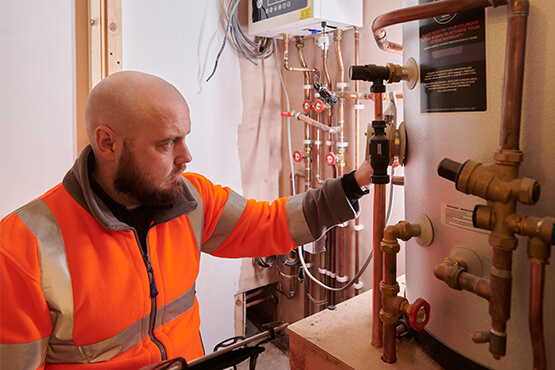
Recycling and waste management
The waste, recycling and resource management sector has a significant role to play in the net zero agenda. The Climate Change Committee Carbon Budget Report in 2020 warned that unless new policies were implemented urgently, the waste sector could generate ‘substantial’ emissions and recommended an acceleration of the UK territorial emissions 80% target by 15 years.
At Browne Jacobson our waste lawyers are committed to supporting our clients across a wide array of transactions and generally navigating through the opportunities and challenges which are fast arising in this sector - including rising fuel prices, increased cost pressures, surging inflation and legislative developments.
We are increasingly seeing clients refer to and focus upon the concept of a circular economy. The implication of such an approach will require major waste law reforms which will be central to developments in the sector over the coming years and require measures to be taken across the entire value chain from production/ consumption to waste and resource management.
Driven and continued investment in UK recycling capacity and capability together with the innovation, development and scale-up of new technologies will also be required. There are also significant infrastructure assets, equipment and fleets within the delivery chain resulting in an increased focus on fleet electrification the use (and integration) of climate/clean/infra-tech and renewable energy resources/alternatives to drive ‘green’ ambitions.
Waste authorities and contractors alike will need to come to terms with the implications of the Environment Act 2021, which has introduced several new measures affecting both waste collection and disposal, particularly in the recycling and reuse of food waste, plastics and bottles.
Separate weekly food collections will soon be required and the introduction of deposit return schemes will present opportunities for the public to recycle drinks containers and cans. Our weaste lawyers are advising our public and private sector clients on how to implement these changes in their current contracts and how to make the best use of the opportunities presented.
Waste to energy projects are fundamental to the long term strategy of landfill diversion through the processing and treatment of waste and providing in many cases a source of renewable energy generation. The UK has been a prominent market for waste projects and our team of waste law experts have advised on numerous waste projects.
Our extensive waste law experience enables us to provide full service legal advice underpinned by specialist sector and asset specific knowledge. Our waste lawyers understand the variety of waste types, different processing techniques and their associated technologies and technical terms commonly used in this sector, enabling us to deliver pragmatic and commercial advice to our clients ‘in their language’.
We are proud to support our clients in delivering essential transactions in the recycling and waste management sector which continue to drive a direct and positive impact on economic, environmental and social prosperity.
What we do
We provide a one-stop shop offering within the waste, recycling and resource management sector including in respect of regulatory, procurement, planning, permitting and authorisation issues, the raising of equity and debt capital, development, everyday operational aspects (including in respect of the ongoing commercial agreements with governments, license agreements and securing/protecting essential IP) and the sale/ acquisition of such assets/businesses including the provision of sector focussed advice around asset level legal due diligence.
Partner led
We believe in smaller, partner led teams - but we can field significant resources when required.
Sector expertise
Our waste law advice is underpinned by recycling and waste management sector and asset specific knowledge and experience.
Solution oriented
We believe that legal and commercial issues should be met with solutions.
Commercial
We add commercial value through providing innovative, practical and thoughtful advice.
Collaborative
Our waste lawyers understand the intricacies of transactions in the recycling and waste management sector and as such we approach transactions in a collaborative and open minded manner.
Timely completion
We are focussed on achieving your deadlines and transaction milestones
Commitment
We are committed to helping you achieve your transactional aims and ensuring you only pay for value.
Strategic partner
We strive to build long-term relationships with our clients, recognising this will require investment and energy.

Our expert waste lawyers provide constructive, innovative and pragmatic advice which addresses and anticipates the wide variety of issues which can arise during transactions. We believe that connection gets results, makes all parties stronger and is central to the Browne Jacobson approach. We’re excited to be growing our relationships with clients, working collaboratively and forging connections in what is likely to be a period of rapid innovation and development for the waste, recycling and resource management sector.

We’re a founding member of Pangea Net and its specialised energy and renewables group. Pangea Net is a non-exclusive network of full-service law firms across the globe, giving our clients to access high- quality, specialist advice, efficiently and cost effectively. The first law firm to become an official partner to O Shaped, an innovative movement with a mission to drive positive change within the legal sector and promote greater collaboration between law firms and their clients.

We provide a one-stop shop offering within the waste, recycling and resource management sector including in respect of regulatory, procurement, planning, permitting and authorisation issues, the raising of equity and debt capital, development, everyday operational aspects (including in respect of the ongoing commercial agreements with governments, license agreements and securing/protecting essential IP) and the sale/ acquisition of such assets/businesses including the provision of sector focussed advice around asset level legal due diligence.
Partner led
We believe in smaller, partner led teams - but we can field significant resources when required.
Sector expertise
Our waste law advice is underpinned by recycling and waste management sector and asset specific knowledge and experience.
Solution oriented
We believe that legal and commercial issues should be met with solutions.
Commercial
We add commercial value through providing innovative, practical and thoughtful advice.
Collaborative
Our waste lawyers understand the intricacies of transactions in the recycling and waste management sector and as such we approach transactions in a collaborative and open minded manner.
Timely completion
We are focussed on achieving your deadlines and transaction milestones
Commitment
We are committed to helping you achieve your transactional aims and ensuring you only pay for value.
Strategic partner
We strive to build long-term relationships with our clients, recognising this will require investment and energy.

Our expert waste lawyers provide constructive, innovative and pragmatic advice which addresses and anticipates the wide variety of issues which can arise during transactions. We believe that connection gets results, makes all parties stronger and is central to the Browne Jacobson approach. We’re excited to be growing our relationships with clients, working collaboratively and forging connections in what is likely to be a period of rapid innovation and development for the waste, recycling and resource management sector.

We’re a founding member of Pangea Net and its specialised energy and renewables group. Pangea Net is a non-exclusive network of full-service law firms across the globe, giving our clients to access high- quality, specialist advice, efficiently and cost effectively. The first law firm to become an official partner to O Shaped, an innovative movement with a mission to drive positive change within the legal sector and promote greater collaboration between law firms and their clients.

Our expertise
Waste dispute enforcement action
Acting for Harlow District Council in relation to a waste dispute and Bassetlaw District Council in relation to a recycling centre which was operating in breach of its environmental permits. The council took enforcement action and we advised on next steps (including c.£3m of remedial works required).
Retail recycling schemes regulation
Advised Sims Metal Management on the regulations governing the operation of recycling schemes from retail outlets and community facilities.
Mergers and acquisitions
Advising Suez SA and its shareholders on its £2 billion acquisition of its former UK waste business - Suez Recycling and Recovery UK - from Veolia.
Advised Igneo Infrastructure Partners on their £995m acquisition of an Energy-from-Waste portfolio from SSE PLC.
Advised Igneo Infrastructure Partners on their acquisition of the entirety of Wheelabrator UK from Macquarie.
Advised Roar B2B on its acquisition of Environment Media Group cementing it as the UK’s leading media group operating in the UK’s environment and waste sector.
IBA treatment facility commercial construction
Advised Covanta Energy on the commercial elements of the construction of an IBA treatment facility at Wellingborough, providing an efficient IBA solution for its energy-from-waste plant
Related expertise
Key contacts

Michael Mousdale
Consultant

Paul Hill
Partner

Craig Elder
Partner








































